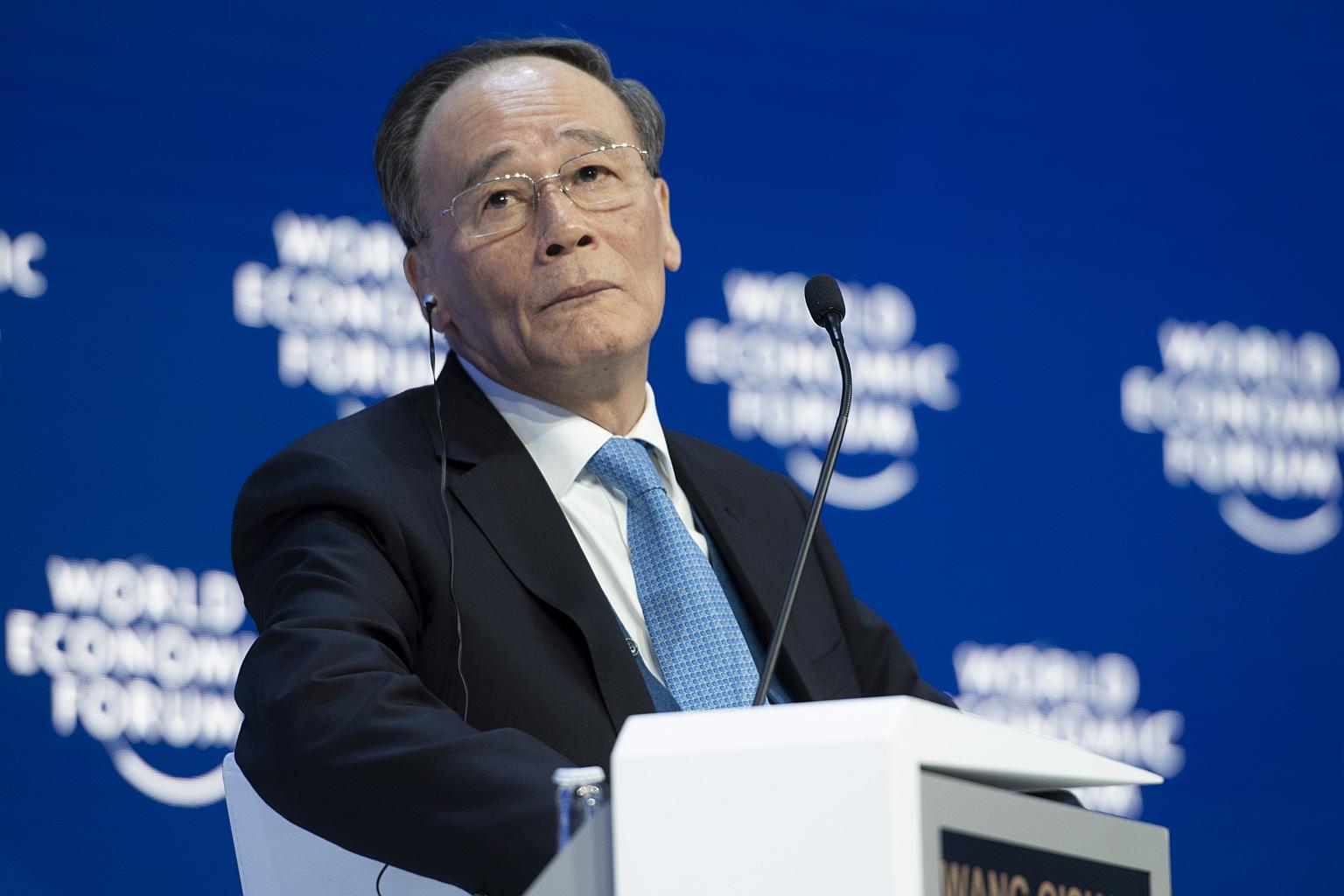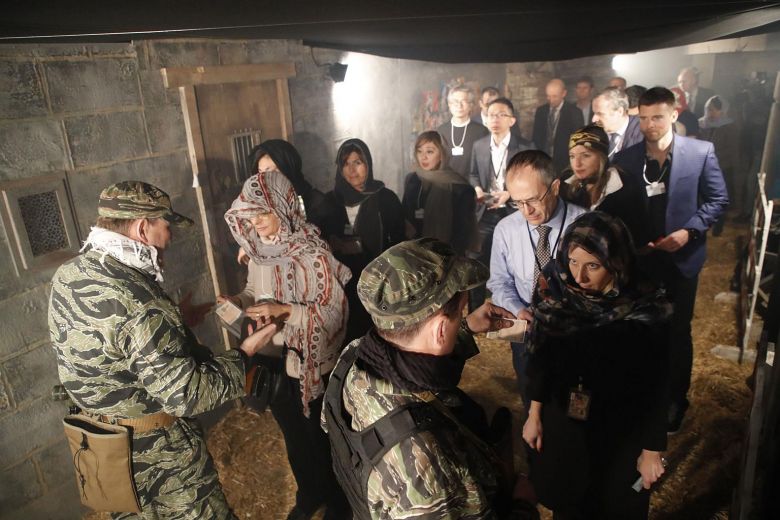World Economic Forum 2019: 3 key takeaways from Davos
Sign up now: Get ST's newsletters delivered to your inbox
Sumiko Tan, Executive Editor In Davos, Sumiko Tan
Follow topic:
DAVOS - "Remember to wear your shoe grips," the woman in the shuttle bus told me. "Last year, my colleague broke her arm on the first day."
For newcomers to the Alpine town of Davos - especially those from the tropics - the weather is probably the main thing that occupies your mind when you arrive.
While snow makes the landscape pretty, it can also turn to ice, leading to treacherous conditions. Grips attached to the soles are essential.
Luckily, the roads in Davos weren't too icy last week when the annual World Economic Forum (WEF) conference took place (Jan 22-25). Visions of broken limbs soon went away and the mind could focus on the topics at hand.
As expected, the US-China trade spat, the state of global trade, the fragmented state of geopolitics and climate change came up a lot.
For me, three other issues stuck out in Davos 2019:
1. China: big, bad wolf or benign superpower?
"Welcome to China," a woman in traditional Chinese costume proclaimed when I stepped into her sight.
She looked unfazed when I walked away. "Welcome to China," she repeated to the next person who walked by.
An exhibition on the Chinese city of Chengdu occupied a prominent space at the lobby of the Sunstar Alpine hotel in Davos last week.
The exhibition, replete with real bamboo trees promoted Chengdu as a modern, progressive green city.
The hotel was a hot spot for the Chinese at the World Economic Forum. When I was there for an hour last Tuesday, seven in 10 faces sitting in the lobby were from China.
The WEF has a good relationship with China. Since 2007, it has held a yearly Meeting of the New Champions in either Tianjin or Dalian. This Summer Davos brings together leaders in emerging technologies.
The Chinese made their presence felt in Davos, dominating not just discourse on trade and policy but also sheer physical presence.
A "Dalian Night" was held at the Congress Centre, the main convention hall, last Wednesday.
Tall, fringed red curtains lined the staircase leading to a wide space where a female instrumental troupe played Chinese music and food stations manned by Shangri-La Dalian staff served pan-fried dumplings and skewered lamb.
A large screen played on continuous loop a video extolling "Digital Dalian" and its many tech marvels. Cute, white fluffy dolphin plushies were distributed and WEF founder Klaus Schwab made an appearance.
But while WEF might be enthusiastic about China, others aren't so embracing.
There's increasing wariness about China, said a Davos participant. "As it becomes more powerful, is it a benign power, or not?"
Observers say this comes on the back of its trade war with the US, and suspicions fanned by the US and its allies that Chinese tech firms could be used by the Chinese government for spying.
The International Monetary Fund has also warned that China's efforts to control its economic slowdown - including fiscal stimulus, infrastructure projects and injecting liquidity - may not be enough.
The mood was different in 2017, when Davos delegates received President Xi Jinping warmly when he made his debut.
His speech defending free trade ticked all the right boxes, especially with Donald Trump about to be inaugurated as US President.
While Mr Xi wasn't there this year, Chinese political and business representatives seemed united in projecting a message of reasonableness and quiet confidence.
They talked about wanting to see the trade war end and expressed optimism that China will continue to drive global growth.
Vice-President Wang Qishan who was there said China's economic growth rate - 6.6 per cent last year, the lowest since 1990 - was "not low at all", and growth will continue and be sustainable.

Chinese Vice-President Wang Qishan attending a plenary session in the Congress Hall at the 49th annual meeting of the World Economic Forum in Davos, Switzerland, on Jan 23, 2019.
PHOTO: EPA-EFE
The wariness of China was most evident at the annual George Soros event at the Seehof hotel on Thursday.
Under a harsh light on a small stage, the 88-year-old Hungarian-American billionaire and activist read out a harsh critique of the Chinese president.
He described Mr Xi as "the most dangerous enemy" of free societies for presiding over a high-tech surveillance regime.
He said Mr Trump should drop trade disputes with other countries and focus on China, and also crack down on tech firms like Huawei and ZTE which could be used to assert authoritarian control.
And, in a backhanded compliment, he said: "China is not the only authoritarian regime in the world but it is the wealthiest, strongest and technologically most advanced."
The next day, China dismissed Mr Soros' speech. A Foreign Ministry spokesman said the remarks were "meaningless and not worth refuting", and that "we hope the relevant American can correct his attitude, not be shortsighted, and hold an objective rational and correct opinion of China's development".
The Davos meeting in January is an annual stock-take on world developments. It will be interesting what Davos 2020 will have to say about China and its place in the world.
2. Artificial Intelligence: Don't let it get out of hand
A major theme at this year's summit was how more needs to be done to curb the negative consequences of artificial intelligence (AI).
Among others, German Chancellor Angela Merkel called for new international rules on data use, and Japanese Premier Shinzo Abe said data governance will be the theme at the G-20 meeting in June in Osaka.
AI has been a topic at Davos over the past few years. The conversation has moved from how it is exciting and revolutionary - robots helping in household chores - to worries that it will replace workers.
The tone on AI this year was decidedly dark, with it being linked to global power struggles, privacy issues, unethical use of data and biases in AI algorithms.
Mr Marc Benioff, CEO and founder of enterprise cloud computing giant Salesforce, called AI a "new human right" and warned of a new tech divide between those who have access to AI and those who do not.
"Today, only a few countries and a few companies have the very best AI," he said at a panel.
"Those who have the best AI will be smarter, healthier, richer, and their warfare will be significantly more advanced… Those without AI are going to be weaker and poorer, less educated and sicker."
Interestingly, Singapore has decided to take a lead on this issue. It released in Davos a framework on how AI can be ethically and responsibly used, which it welcomes businesses in Singapore and elsewhere to adopt.
The framework, a living document that will be tweaked with feedback, is the first in Asia to provide detailed and readily implementable guidance.
Singapore is also working with the World Economic Forum's Centre for the Fourth Industrial Revolution to further drive AI and data innovation. This would include engaging organisations to discuss Singapore's framework and facilitate its adoption.
3. Doing good in a dog-eat-dog world
Within minutes, we realised that the best way to survive was to look down. Eye contact was going to get you noticed by the guards, and being noticed was not good on a refugee boat or in a camp.
Last Wednesday, I joined 30 others in the "A Day in the Life of a Refugee" project, which has been part of the World Economic Forum (WEF) programme for several years.
Against a soundscape of screams, crying and gunshots, we were pushed around darkened rooms, shouted at, lectured to, packed into pitch-black tents and, for some unlucky ones, punished by kneeling.

Ms Akie Abe (centre), the wife of Japanese PM Shinzo Abe taking part in the "A Day in the Life of a Refugee" project during the World Economic Forum in Davos.
PHOTO: DAVID MCINTYRE/CROSSROADS FOUNDATION LTD
After this 45-minute simulation, the lights came on and the next 30 minutes were spent discussing the plight of refugees.
The project is by Hong Kong-based Crossroads Foundation and it was an affecting and sobering experience for the participants, which included Mrs Akie Abe, wife of the Japanese Prime Minister, in the session I attended.
The WEF declares that it is "committed to improving the state of the world".
But it is easy to be cynical about this do-good aim in the forum's elitist setting.
I was in a shuttle bus late one night with four others when an American woman struck up a conversation with a British author-entrepreneur.
"Are you successful?" the American - who joked that she was tipsy - asked.
"Well, I am in Davos," the British woman replied.
For all the Davos talk about a more egalitarian world, the forum is itself highly hierarchical.

There are about 10 types of forum badges, each pegging you to your place. It is not uncommon to see someone you just met sneak a look at the status of your badge.
The top-tier badge is white and covers delegates - government leaders, CEOs, their spouses and also senior journalists. Then there are orange badges for media covering the event, and other shades of blue, purple and green for staff, volunteers and technicians.
I was at a bar counter at the convention centre one evening when an exhausted-looking man in a windbreaker asked for a glass of wine.
The bartender was about to pour it for him when he saw that the man had a purple badge. These are for technicians whose job includes lugging heavy equipment in freezing temperatures.
"Purple, no wine," the bartender said, but relented and poured him a drink. It was gulped down quickly.
Still, there is no mistaking an air of earnestness in Davos.
Microsoft founder Bill Gates still finds it worth his while attending it to persuade fellow billionaires to help fight diseases in the world's poorest countries.
Swedish teenager Greta Thunberg took a train to tell the grown-ups there that it will be their fault if they do not do more to stop an unfolding environmental catastrophe. "I don't want your hope. I want you to panic… and act."
From the faces of fellow participants at the refugee event, I think the message of helping those who need help sunk in, at least a little.

